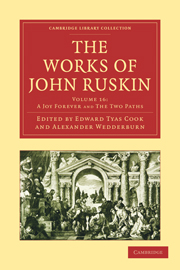Book contents
- Frontmatter
- Contents
- LIST OF ILLUSTRATIONS
- INTRODUCTION TO THIS VOLUME
- PART I “A JOY FOR EVER” BEING THE SUBSTANCE (WITH ADDITIONS) OF TWO LECTURES ON THE POLITICAL ECONOMY OF ART (1857, 1880)
- PART II INAUGURAL ADDRESS AT THE CAMBRIDGE SCHOOL OF ART (1858)
- PART III THE OXFORD MUSEUM (1858, 1859)
- PART IV “THE TWO PATHS” (1859)
- APPENDIX: ADDRESSES AND LETTERS 1856–1860
- I REMARKS ON THE RECENT PROGRESS OF DESIGN AS APPLIED TO MANUFACTURE (MARCH 12, 1856)
- II AN ADDRESS TO THE WORKMEN EMPLOYED ON THE OXFORD MUSEUM (APRIL 18, 1856)
- III THE VALUE OF DRAWING: ADDRESS TO THE ST. MARTIN'S SCHOOL OF ART (APRIL 3, 1857)
- IV THE PRESERVATION OF ITALIAN PICTURES: REMARKS AT A MEETING OF THE ARUNDEL SOCIETY (JUNE 25, 1857)
- V THE ARTS AS A BRANCH OF EDUCATION: A LETTER TO THE REV. F. TEMPLE (SEPTEMBER 27, 1857)
- VI THE STUDY OF ART: ADDRESS TO THE ST. MARTIN'S SCHOOL OF ART (APRIL 16, 1858)
- VII VENETIAN ARCHITECTURE: REMARKS MADE AT A MEETING OF THE ARCHITECTURAL PHOTOGRAPHIC SOCIETY (FEBRUARY 15, 1859)
- VIII RELIGIOUS ART: REMARKS MADE AT A MEETING OF THE WORKING MEN'S COLLEGE (MARCH 8, 1860)
- IX EVIDENCE GIVEN BEFORE THE SELECT COMMITTEE ON PUBLIC INSTITUTIONS (MARCH 20, 1860)
- Plate section
I - REMARKS ON THE RECENT PROGRESS OF DESIGN AS APPLIED TO MANUFACTURE (MARCH 12, 1856)
Published online by Cambridge University Press: 07 September 2011
- Frontmatter
- Contents
- LIST OF ILLUSTRATIONS
- INTRODUCTION TO THIS VOLUME
- PART I “A JOY FOR EVER” BEING THE SUBSTANCE (WITH ADDITIONS) OF TWO LECTURES ON THE POLITICAL ECONOMY OF ART (1857, 1880)
- PART II INAUGURAL ADDRESS AT THE CAMBRIDGE SCHOOL OF ART (1858)
- PART III THE OXFORD MUSEUM (1858, 1859)
- PART IV “THE TWO PATHS” (1859)
- APPENDIX: ADDRESSES AND LETTERS 1856–1860
- I REMARKS ON THE RECENT PROGRESS OF DESIGN AS APPLIED TO MANUFACTURE (MARCH 12, 1856)
- II AN ADDRESS TO THE WORKMEN EMPLOYED ON THE OXFORD MUSEUM (APRIL 18, 1856)
- III THE VALUE OF DRAWING: ADDRESS TO THE ST. MARTIN'S SCHOOL OF ART (APRIL 3, 1857)
- IV THE PRESERVATION OF ITALIAN PICTURES: REMARKS AT A MEETING OF THE ARUNDEL SOCIETY (JUNE 25, 1857)
- V THE ARTS AS A BRANCH OF EDUCATION: A LETTER TO THE REV. F. TEMPLE (SEPTEMBER 27, 1857)
- VI THE STUDY OF ART: ADDRESS TO THE ST. MARTIN'S SCHOOL OF ART (APRIL 16, 1858)
- VII VENETIAN ARCHITECTURE: REMARKS MADE AT A MEETING OF THE ARCHITECTURAL PHOTOGRAPHIC SOCIETY (FEBRUARY 15, 1859)
- VIII RELIGIOUS ART: REMARKS MADE AT A MEETING OF THE WORKING MEN'S COLLEGE (MARCH 8, 1860)
- IX EVIDENCE GIVEN BEFORE THE SELECT COMMITTEE ON PUBLIC INSTITUTIONS (MARCH 20, 1860)
- Plate section
Summary
1. Mr. Ruskin was quite sure that the Society must be grateful to Mr. Wallis for the clearness with which he had brought certain facts before them, and he should not venture to contravene the principles which seemed to be involved in the statement, because he was not sure how far certain other principles might be accepted, though not stated by Mr. Wallis. There were many things which he had stated that he (Mr. Ruskin) should feel it otherwise his duty to oppose, but he thought they afforded rather the materials for a subsequent paper. He would rather request information from Mr. Wallis as to the exact sense in which his principles were to be received, for he could not arrive at any definite notion as to what the general idea of excellence was, by which each branch of art was tested.
2. They had heard, for instance, an ungallant attack upon the ladies for promoting a base manufacture of carpets, admitting the complete imitation of flowers. He could not blame the ladies in this, chiefly because he knew a most respectable and long-established firm, engaged in carpet manufacture on an extensive scale, which conducted its business on the principle Mr. Wallis opposed. He referred to the firms whose head partners, the months of April and May, supplied a large part of the world with green carpets, in which floral design was largely introduced, and he believed generally to the satisfaction of the public.
- Type
- Chapter
- Information
- The Works of John Ruskin , pp. 427 - 430Publisher: Cambridge University PressPrint publication year: 2010First published in: 1905



